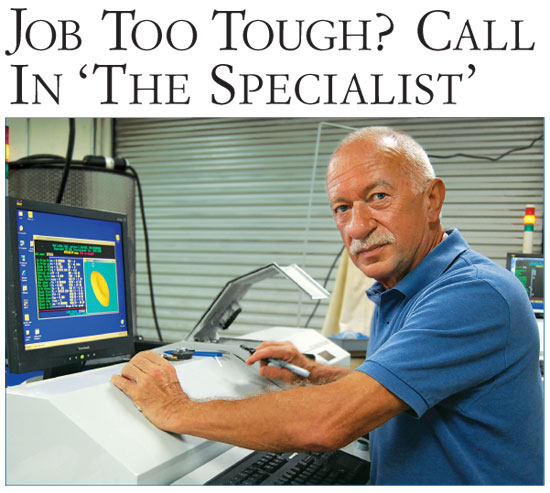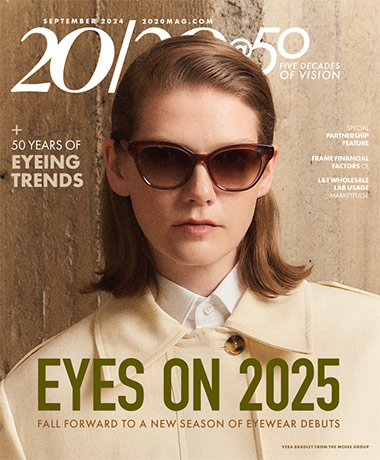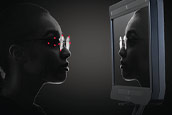
Full service wholesale labs can usually handle about 99.5 percent to 99.8 percent of the jobs they are sent. The remaining 0.2 percent to 0.5 percent of work typically requires special tooling, special equipment, special knowledge or special care. That slender but profitable niche is where Quest Optical Specialty Lab operates. Based in Largo, Fla., Quest is known as a “lab’s lab” that does specialty lab work for other wholesale labs in the U.S. and more than 17 countries around the world.
Quest’s founder and owner Michael Walach is the driving force behind this unique enterprise. Walach’s vast knowledge of optics plus his extraordinary engineering know-how allow him and his team to tackle challenging jobs that often result in one-of-a-kind lenses. That rare combination of skills has made him the go-to resource not only for other labs, but for lens companies and lab equipment manufacturers as well.
A lifelong jazz lover and a skilled trombonist, Walach is a born improviser who infuses Quest Lab with his creative spirit.
—Andrew Karp
L&T: Why does a lab need to send work to another lab?
Walach: When a lab does a specialty job in-house, often the job has to be redone once or twice, which causes delay in service, and requires the attention of the most skilled and experienced technicians who could be utilized better taking care of the 99.5 percent of the production. The lack of special tooling, jigs or software are often the reason why lenses are not of the optimum form, and most of the time it proves to be unprofitable and a pain in the neck. Quest Lab does nothing else but those jobs to make life easier for other labs. That translates to more profit for the lab, more customer satisfaction and loyalty. That’s why we’re the “Lab’s Lab.”
What sets Quest apart from other labs?
The technology? The know-how?
I have been in the lab business for a long time and have firsthand experience across a broad spectrum of the prescription lens design, process control and processing technology. So I decided to utilize my experience and knowledge to create a true specialty lens lab. I make every effort to be the best at it.
I have amassed some of the most technologically advanced specialty lens production equipment and combined it with basic modified conventional equipment including hand pans, spherical lap cutters and a unique lap system. Then I added some band saws, pad stamp presses and various jigs. I have written specialty lens design software and employ various process control instruments. We have fired it up in June 2004. At that time I trained two technicians and alongside them personally supervised every step of every job. Today we have 15 specialty lens trained technicians working entirely independently. So… is it technology or know-how? It is not a question of “or” but “and.” The technology and know-how are inseparable.
How did your background in optics prepare you to run a lab like Quest?
Without a solid background in optics, math, physics, software, electronics, lens design, comprehension of the vision process and a lot of hands-on experience in all of the above, it would be quite difficult, if not impossible; at least not to that extent. Also, as a jazz musician since my early teens, improvisation and creative thinking outside of the box sure helps.
What types of Rx jobs does Quest specialize in?
We specialize in specialty prescription lens work. If you consider that most full-service optical labs can do 99.5 percent to 99.8 percent of the Rx work the lab receives, it is virtually impossible that specialty lens labs would specialize in only slab offs, myodiscs or aniseikonic correction lenses; sometimes you have to make a lens that requires all of it. Perhaps to best answer that question is to say that we have never refused a prescription, however complex, extreme or unusual as long as it makes mathematical and logical sense. We have made lenses +50.00 D, 60.0 D of vertical imbalance, -18.00 cylinders or double convex hi-index bi-lenticulars, we make any power Rx lenses for telescopes as small as 12 mm diameter, lenses for musicians, quadrifocals for commercial pilots, therapeutic yoked prism lenses for behavioral therapy, etc. Simply put, we do only specialty prescription lenses—all of it, that is what we do.
The word “customized” is often used by lens companies and labs to describe their products. Yet customization can mean different things depending upon the individual job. What does it mean at Quest Lab?
With the free-form technology expansion, the word “customized” began to be widely used to describe a variety of “customized” free-form lens designs, causing confusion and misunderstanding, just like the word “digital.” At Quest Lab, customized is more like a custom tailor or custom shoemaker. We do not have a mass production; every lens is “made to measure” like a custom-made suit or pair of shoes. The tailor has to take measurements of the length and the circumference of each of your legs, of your arms, chest, waist, your posture, habits, the intended use, etc., and creates a one-of-a-kind suit, just and only for you. The lenses we make at Quest Lab usually require more information about the patient’s visual acuity in each eye, detailed information about the old eyeglasses, lens form of the old lenses, patient’s age, mental or physical deficiencies, habits, intended use, etc. Of course, this is on top of the standard lab information like frame size, frame type, Rx, PD, fitting heights and whatever else might be the standard relevant lab information standard wholesale labs might require.
Because of that, in addition to a conventional Lab Management System with true Individual Lens Technology capabilities, we also have other proprietary in-house created tools like interactive specialty lens design software, CAD system, special functions software, custom-made, computer controlled process control instruments, special custom tooling and other necessary custom production aids. To sum it up, at Quest Lab “customized” means customization in its true sense: the quintessential customization.
What are some of the most challenging jobs Quest has done?
Some of the most challenging jobs we have done might be along the line of meridional aniseikonic correction lenses, sectoral prisms or extreme plus power corrections for children’s swimming goggles, where we have to design one lens for above the water and the other lens for underwater correction. Last week I had a request from Laurie Pierce, one of the faculty members from the opticianry course at Hillsborough Community College in Tampa. Laurie does frequent public speaking and likes to look into the eyes of her audience. Her problem was hunching on the stage because of her progressive lenses and the stage level being a few feet above the audience floor. We made Laurie a pair of free-form PALs with yoked prism base down to raise her audience a few feet up. It worked great for her. We have made different yoked prism lenses for an OD that uses them for hyperactive kids to calm them down, yoked prisms base up around 7 mm below the upper rim, double-sided high-index lenticulars, glasses for musicians. We make quadrifocals or PALs with intermediate vision HD RS 35 on top for airline pilots and the Chemistrie G15 Clip in the middle of the lens for protection from the sun, with clear near and upper intermediate lens area. The list of interesting specialty lens solutions goes on and on. ■










